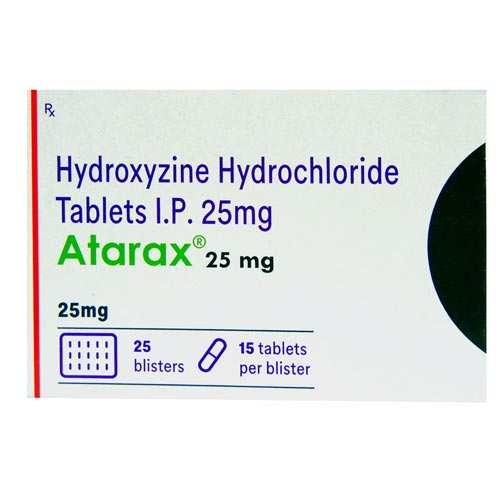Description
Hydroxyzine is a histamine H1 receptor antagonist that is effective in the treatment of chronic urticaria, dermatitis, and histamine-mediated pruritus. Unlike its major metabolite cetirizine, it does cause drowsiness. It is effective as an antiemetic, for relief of anxiety and tension; reduces activity in the central nervous system, it can be used as a sedative to treat anxiety and tension.. It is also used together with other medications given during and after general anesthesia.
Hydroxyzine is an antihistamine that reduces the effects of natural chemical histamine in the body. Histamine can produce symptoms of itching, or hives on the skin. Hydroxyzine may be used to treat allergic skin reactions such as hives or contact dermatitis.
Hydroxyzine is used for symptomatic relief of anxiety and tension associated with psychoneurosis and as an adjunct in organic disease states in which anxiety is manifested. Useful in the management of pruritus due to allergic conditions such as chronic urticaria.
Hydroxyzine is also used to treat allergic skin reactions such as hives or contact dermatitis.
Pharmacodynamics
Hydroxyzine, a piperazine antihistamine structurally related to buclizine, cyclizine, and meclizine, is used to treat histamine-mediated pruritus or pruritus due to allergy, nausea and vomiting, and, in combination with an opiate agonist, anxiolytic pain.
Hydroxyzine is also used as a perioperative sedative and anxiolytic and to manage acute alcohol withdrawal. Hydroxyzine’s active metabolite, cetirizine, is also used as an H1-antagonist.
Mechanism of action
Hydroxyzine competes with histamine for binding at H1-receptor sites on the effector cell surface, resulting in suppression of histaminic edema, flare, and pruritus.
The sedative properties of hydroxyzine occur at the subcortical level of the CNS. Secondary to its central anticholinergic actions, hydroxyzine may be effective as an antiemetic.
Side effects
All medicines may cause side effects, but many people have no, or minor, side effects.Some medical conditions may interact with Hydroxyzine.
Tell your doctor or pharmacist if you have any medical conditions.
Common hydroxyzine side effects may include: drowsiness, headache, dry mouth or skin rash.
This is not a complete list of all side effects that may occur. If you have questions about side effects, contact your health care provider.


Reviews
There are no reviews yet.